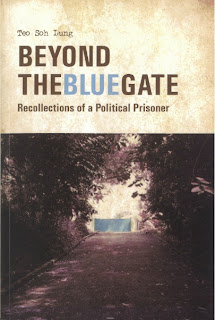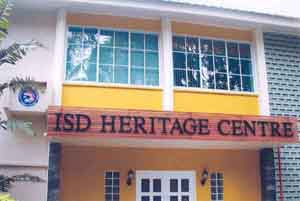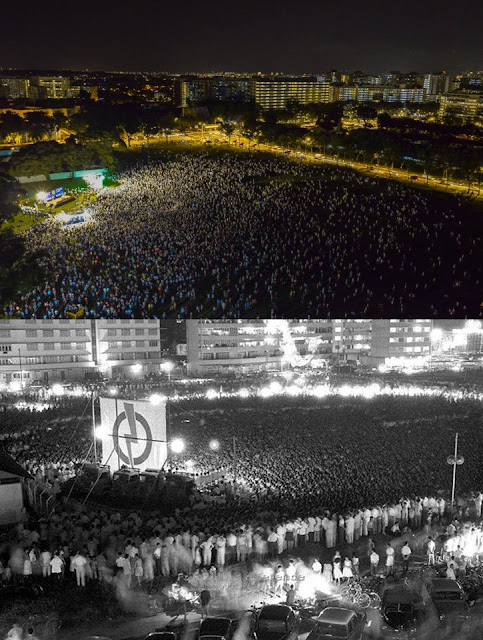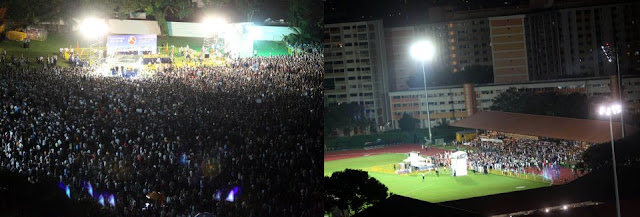by Teo Soh Lung
An excerpt of Chief Justice Chan Sek Keong’s lecture delivered at the Rule of Law Symposium on 15 February 2012 was published in TODAY on 21 February 2012. At least three friends drew my attention to the article that morning because my case was cited in the speech. I was not particularly interested in the speech but read it when I was given a copy. Perhaps because it was just an excerpt, I didn’t find it particularly noteworthy, except for the fact that it was probably the first time my case was mentioned in the press after more than 20 years.
The Chief Justice in disagreeing with the interpretation of some academics who expressed the view that there is no judicial review in preventive detention said: “But Teo’s appeal … was dismissed on the ground that she had failed to discharge the burden of proving that her re-detention was not based on national security considerations.”
What then is the burden of proof on a ISA prisoner? Having attempted to get out of prison through four rounds of litigation, I can confirm that the burden is very, very heavy and I would not encourage anyone to take the same course unless he is prepared not to succeed. Even with simple facts and the best lawyers, as were the facts and lawyers who acted for me, I did not succeed. I have set out in detail the obstacles I faced in my book, Beyond the Blue Gate, Recollections of a Political Prisoner and I will not repeat what I said there.
It is interesting that there was a symposium to discuss the rule of law two decades after my case was decided. During those two decades, 79 people have been detained under the ISA but none of the detainee had challenged the legality of their imprisonment. The lesson learnt from my case had probably sunk so deep that no one had thought it wise to attempt what I did!
As of today, there are at least 19 people who are still in prison under the ISA. At least eight of them have been in prison for ten years or more. We know nothing about these prisoners. The Advisory Board which periodically review their plight do not tell us why these eight continue to be in prison. The Justices of Peace who visit them have also said nothing. So we remain ignorant of the plight of these unknown men who we are told by the Minister for Home Affairs, are all Muslims. Will they one day in the future, try to clear their names, like the 1987 “Marxist conspirators” are trying to do 25 years after the event? I don’t know.
Coming back to the subject of judicial review and the rule of law. What is the burden that a prisoner must discharge before he can succeed in persuading the courts to free him? Let me discuss this subject with reference to the facts in my case.
When I was first arrested on 21 May 1987, the government alleged that I was a ”Marxist conspirator”, whatever that term meant. A decade earlier, in 1977, those arrested were called “Euro-communists”. The PAP government are masters at crafting names that instil great fear in law abiding citizens.
I was accused of being a participant in a conspiracy to overthrow the government using “communist united front tactics”. Again, whatever that meant, only the PAP can clarify. I didn't know the meaning of "communist united front tactics" when I first read the grounds of detention and asked my case officer what it was all about. He was taken aback by my question. Until today, I still do not know what the term refers to. It may be clear to historians who are in the habit of writing PAP history but not those who question if there was indeed such a tactic.
I was released a few months after but in April 1988, together with eight others, I issued a joint statement denying the government’s allegations of a conspiracy and confirming that we were subjected to physical and mental abuse. The next day, we were rearrested.
I took out an application for habeas corpus soon after. Both Lord Lester QC and the Late Lord Alexander QC were optimistic that I would succeed because the reason for my rearrest was so clearly related to the issue of the joint statement, which was of course, an exercise of free speech. Between the date I was released and the date of my rearrest, Singapore enjoyed great peace as was the case even before my arrest. There was not even a peaceful protest on the street. I was back in legal practice trying to make a decent living during those months.
In December 1988, the court of appeal which comprised the Chief Justice and two other judges refused to adjudicate on the facts of my case. It ruled that the government did not comply with a technicality (which technicality was not even argued by my lawyers) and ordered my release together with my three friends. The appeal judges talked about the importance of judicial review and the rule of law but refused to make a ruling on the facts of my case. Needless to say, I was completely shattered shortly after because I was rearrested immediately after being tricked out of the prison gate.
The government then proceeded to amend the ISA and the Constitution. The intention of the amendments was clear to me – that the government would not tolerate judicial review and would have nothing to do with the rule of law, at least in ISA cases. It said so through the Public Prosecutor, Mr Tiwari : “The expression ‘rule of law’ has no defined or definable content and it would be wrong for judges to defeat the clear intent of Parliament by reference to such vague concepts…”
If the courts had wanted to protect their judicial power, it could have done so by agreeing with Lord Lester’s submission that parliament had no power to amend the Constitution in a manner which violates its basic structure by usurping judicial power which is vested solely in the judiciary. The courts for reasons that I will never know, failed to do so. By failing to do so, I can only assume that it did not want to retain such power, at least in ISA cases and would prefer the government to have a free hand. The government was of course happy to have judicial power. In October 2011, Deputy Prime Minister, Teo Chee Hean said:
“…giving the final say on what constitutes a serious threat to national security to a judge would in effect mean that the judge rather than the Government becomes responsible for, and answerable for decisions affecting the national security of Singapore.
In Singapore, this responsibility and accountability to act to protect national security is placed in the hands of the Government…” (ST 20 Oct 2011).
Would more symposiums and dialogues on the rule of law be of any use for the future. Simon Chesterman, the dean of the National University of Singapore Faculty of Law seemed to think so. (ST 22 Feb 2012). Maybe. More discussions may clarify what judicial review and the rule of law is all about and give courage to whoever needs to make a bold decision. But will such an opportunity arise?
Judges do justice, not politics: CJ Chan : Straits Times
An excerpt of Chief Justice Chan Sek Keong’s lecture delivered at the Rule of Law Symposium on 15 February 2012 was published in TODAY on 21 February 2012. At least three friends drew my attention to the article that morning because my case was cited in the speech. I was not particularly interested in the speech but read it when I was given a copy. Perhaps because it was just an excerpt, I didn’t find it particularly noteworthy, except for the fact that it was probably the first time my case was mentioned in the press after more than 20 years.
The Chief Justice in disagreeing with the interpretation of some academics who expressed the view that there is no judicial review in preventive detention said: “But Teo’s appeal … was dismissed on the ground that she had failed to discharge the burden of proving that her re-detention was not based on national security considerations.”
What then is the burden of proof on a ISA prisoner? Having attempted to get out of prison through four rounds of litigation, I can confirm that the burden is very, very heavy and I would not encourage anyone to take the same course unless he is prepared not to succeed. Even with simple facts and the best lawyers, as were the facts and lawyers who acted for me, I did not succeed. I have set out in detail the obstacles I faced in my book, Beyond the Blue Gate, Recollections of a Political Prisoner and I will not repeat what I said there.
It is interesting that there was a symposium to discuss the rule of law two decades after my case was decided. During those two decades, 79 people have been detained under the ISA but none of the detainee had challenged the legality of their imprisonment. The lesson learnt from my case had probably sunk so deep that no one had thought it wise to attempt what I did!
As of today, there are at least 19 people who are still in prison under the ISA. At least eight of them have been in prison for ten years or more. We know nothing about these prisoners. The Advisory Board which periodically review their plight do not tell us why these eight continue to be in prison. The Justices of Peace who visit them have also said nothing. So we remain ignorant of the plight of these unknown men who we are told by the Minister for Home Affairs, are all Muslims. Will they one day in the future, try to clear their names, like the 1987 “Marxist conspirators” are trying to do 25 years after the event? I don’t know.
Coming back to the subject of judicial review and the rule of law. What is the burden that a prisoner must discharge before he can succeed in persuading the courts to free him? Let me discuss this subject with reference to the facts in my case.
When I was first arrested on 21 May 1987, the government alleged that I was a ”Marxist conspirator”, whatever that term meant. A decade earlier, in 1977, those arrested were called “Euro-communists”. The PAP government are masters at crafting names that instil great fear in law abiding citizens.
I was accused of being a participant in a conspiracy to overthrow the government using “communist united front tactics”. Again, whatever that meant, only the PAP can clarify. I didn't know the meaning of "communist united front tactics" when I first read the grounds of detention and asked my case officer what it was all about. He was taken aback by my question. Until today, I still do not know what the term refers to. It may be clear to historians who are in the habit of writing PAP history but not those who question if there was indeed such a tactic.
I was released a few months after but in April 1988, together with eight others, I issued a joint statement denying the government’s allegations of a conspiracy and confirming that we were subjected to physical and mental abuse. The next day, we were rearrested.
I took out an application for habeas corpus soon after. Both Lord Lester QC and the Late Lord Alexander QC were optimistic that I would succeed because the reason for my rearrest was so clearly related to the issue of the joint statement, which was of course, an exercise of free speech. Between the date I was released and the date of my rearrest, Singapore enjoyed great peace as was the case even before my arrest. There was not even a peaceful protest on the street. I was back in legal practice trying to make a decent living during those months.
In December 1988, the court of appeal which comprised the Chief Justice and two other judges refused to adjudicate on the facts of my case. It ruled that the government did not comply with a technicality (which technicality was not even argued by my lawyers) and ordered my release together with my three friends. The appeal judges talked about the importance of judicial review and the rule of law but refused to make a ruling on the facts of my case. Needless to say, I was completely shattered shortly after because I was rearrested immediately after being tricked out of the prison gate.
The government then proceeded to amend the ISA and the Constitution. The intention of the amendments was clear to me – that the government would not tolerate judicial review and would have nothing to do with the rule of law, at least in ISA cases. It said so through the Public Prosecutor, Mr Tiwari : “The expression ‘rule of law’ has no defined or definable content and it would be wrong for judges to defeat the clear intent of Parliament by reference to such vague concepts…”
If the courts had wanted to protect their judicial power, it could have done so by agreeing with Lord Lester’s submission that parliament had no power to amend the Constitution in a manner which violates its basic structure by usurping judicial power which is vested solely in the judiciary. The courts for reasons that I will never know, failed to do so. By failing to do so, I can only assume that it did not want to retain such power, at least in ISA cases and would prefer the government to have a free hand. The government was of course happy to have judicial power. In October 2011, Deputy Prime Minister, Teo Chee Hean said:
“…giving the final say on what constitutes a serious threat to national security to a judge would in effect mean that the judge rather than the Government becomes responsible for, and answerable for decisions affecting the national security of Singapore.
In Singapore, this responsibility and accountability to act to protect national security is placed in the hands of the Government…” (ST 20 Oct 2011).
Would more symposiums and dialogues on the rule of law be of any use for the future. Simon Chesterman, the dean of the National University of Singapore Faculty of Law seemed to think so. (ST 22 Feb 2012). Maybe. More discussions may clarify what judicial review and the rule of law is all about and give courage to whoever needs to make a bold decision. But will such an opportunity arise?
-------------------











































